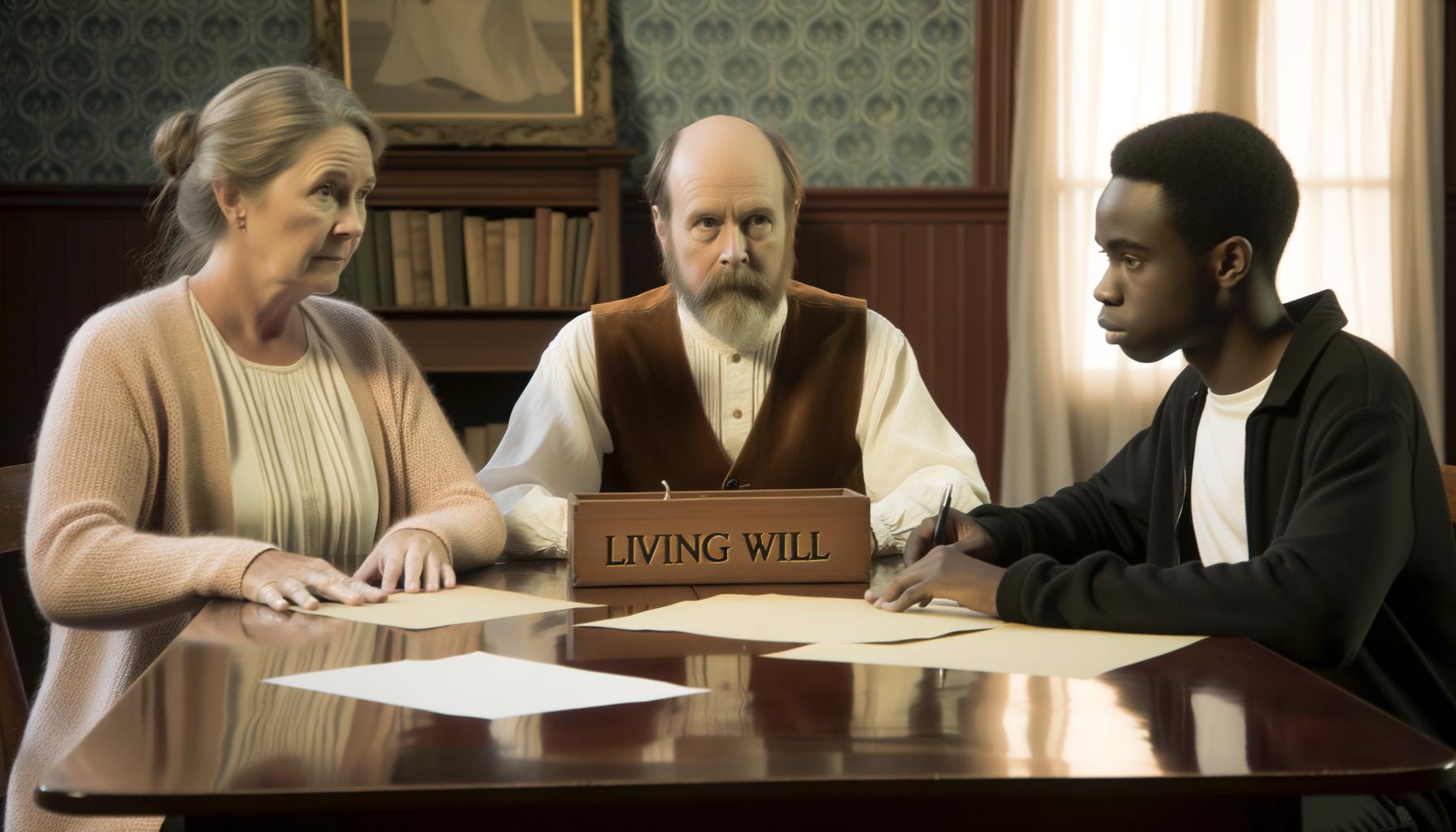In today’s fast-paced world, the peace of mind that living wills provide has become increasingly invaluable. As more individuals recognize the significance of making their medical and end-of-life wishes known, the trend of creating living wills has gained momentum, especially among residents in Westminster. This important document ensures that your healthcare preferences are respected even when you can’t voice them yourself, reflecting your personal values and desires.
A living will is a legal document that outlines an individual’s decisions regarding medical treatments in scenarios where they may be incapacitated or unable to communicate their wishes. These directives can range from preferred life-sustaining measures to specific types of medical care one would like to receive or avoid. The primary goal is to guide healthcare providers and loved ones, reducing uncertainties and potential conflicts during emotionally charged times.
This blog post aims to walk Westminster residents through the meticulous process of creating living wills that truly mirror their values and beliefs. We’ll delve into why having a living will is crucial, explore local legal requirements, and offer practical advice on identifying core values and appointing trusted proxies. By providing clear guidelines and avoiding common pitfalls, this guide empowers you to take control of your future healthcare decisions with confidence.
Understanding the Importance of Living Wills
Why You Need a Living Will
Living wills play an essential role in ensuring that your healthcare preferences are honored, especially during situations where you might not be able to communicate them yourself. Imagine facing a severe medical condition that leaves you incapacitated; a living will can provide clear instructions on the types of medical interventions you would or would not want.
This is crucial in circumstances involving terminal illnesses, severe injuries, or irreversible comas where decisions about life-sustaining treatments need to be made swiftly. By having your wishes documented, living wills take the emotional burden off your loved ones and ensure that you receive care aligned with your values.
Moreover, having a clearly articulated living will offers peace of mind not just to the individual but also to their families. Often family members face difficult choices without knowing precisely what their loved one would have wanted. In such emotionally taxing moments, disputes can arise among family members as they attempt to make critical decisions.
With a properly prepared living will, these potential conflicts are minimized because there’s already a written document outlining what should be done. This level of clarity helps alleviate stress and provides assurance that all actions taken align with the individual’s desires.
Legal Framework in Westminster
In Westminster, the legal parameters surrounding living wills are well-defined to protect both individuals and their healthcare proxies from any legal ambiguities. The city follows specific guidelines laid out by the state that dictate how a living will must be created, witnessed, and executed for it to hold legal validity. Understanding these regulations is vital for ensuring your living will complies with local laws and truly serves its purpose when required.
Westminster law stipulates particular requirements regarding who can act as witnesses for the signing of living wills and how many witnesses are necessary for validation. Additionally, notarization might be required to affirm the authenticity of the document.
Familiarity with these rules ensures that you fulfill every legal obligation while drafting your living will so it cannot be contested later due to technicalities or perceived lapses in its creation process. For residents of Westminster considering drafting or updating their living wills, consulting local counsel experienced in estate planning or health law can offer tailored advice and peace of mind.
The Impact on Families
A comprehensive understanding of why a living will is indispensable delves deeper than mere legalities-its significance profoundly impacts familial relationships and emotional well-being during crises. For families navigating an already challenging period marked by medical uncertainty, having guidance through a pre-written directive helps cushion some emotional strains associated with making dire health decisions under pressure.
When family members know they are indeed following explicit directives expressed by their loved one through a legally binding document like a living will, it unifies them around clear-cut choices rather than forcing them into debates fraught with guesswork and emotional turmoil.

Eventually, this alleviates lingering guilt or second-guessing about whether they made the right decision regarding life-sustaining treatments or end-of-life care because those tough decisions were already thoughtfully addressed long before confronting any emergency situation.
Identifying Your Core Values and Beliefs
To draft a living will that genuinely aligns with your values, it’s essential to engage in self-reflection and comprehensive discussions. This process begins with identifying your core values and beliefs, which serve as the foundation for your medical care preferences and other directives.
Self-Assessment
Identifying your core values is a crucial first step in creating a living will that is truly reflective of who you are. Self-assessment tools can be incredibly helpful in this journey. Consider questions like: What quality of life do you find acceptable?
How do you feel about life-sustaining treatments such as mechanical ventilation or tube feeding? Reflecting on past experiences, whether they involve personal health scares or witnessing the medical journeys of loved ones, can also provide insight into your values and wishes for end-of-life care.
Consulting Loved Ones
Once you’ve done some self-reflective work, it’s time to speak with those closest to you. Family discussions play an instrumental role in clarifying and solidifying your values.
It’s important to approach these talks openly and sensitively, keeping in mind that these conversations may be difficult but are ultimately beneficial for everyone involved. Communication helps ensure that those who might need to make decisions on your behalf understand your wishes completely-especially if they are appointed as your healthcare proxy.
Engagement With Health Professionals
Bringing healthcare professionals into the conversation can also offer valuable perspectives and information tailored to Westminster regulations. Doctors can help clarify what certain medical interventions entail, thus enabling you to make more informed choices when drafting your living will. Combining professional advice with deeply considered personal values creates a robust document that truly reflects what matters most to you.
Living wills are not just about listing medical interventions; they’re about expressing who you are at a fundamentally human level-a blend of values shaped by experience and thoughtful consideration. Engaging in a thorough process of self-assessment, combined with family discussion and professional guidance, ensures that your living will serves its intended purpose effectively.
Key Components of a Living Will
A key aspect of your living will involves clearly articulating your medical care preferences. This section should comprehensively cover the types of medical treatments and interventions you are comfortable with, especially concerning life-sustaining measures like mechanical ventilation, resuscitation, and feeding tubes.
To specify your preferences effectively, consider scenarios such as permanent unconsciousness or terminal illness. For example, you might decide against artificial nutrition if you believe it would only prolong the dying process without contributing to recovery or quality of life.
Beyond specific medical interventions, it’s crucial to address your personal definitions of quality of life within the living will. Quality of life is a subjective term that varies greatly from person to person based on individual values and experiences.
Reflect on what aspects make life meaningful for you-whether it’s the ability to communicate with loved ones, enjoy hobbies, or maintain independence. By explicitly stating these in your living will, you ensure that any healthcare decisions made on your behalf align closely with what you deem important for a fulfilling existence.
Another vital component is appointing a health care proxy (also known as a durable power of attorney for healthcare). This person will have the authority to make medical decisions on your behalf if you’re unable to do so yourself. Choose someone you trust deeply and who understands your values and wishes thoroughly.

In Westminster, there are legal requirements to formalize this appointment, which include drafting specific documents and ensuring all conditions are met according to local regulations. The appointed proxy should understand their responsibilities and be prepared to advocate assertively for your expressed wishes under various circumstances.
| Component | Description |
|---|---|
| Medical Care Preferences | Detailed instructions regarding treatment types, especially life-sustaining measures. |
| Quality of Life Considerations | Personal definitions of what constitutes an acceptable quality of life. |
| Health Care Proxy | A trusted individual legally appointed to make healthcare decisions on one’s behalf. |
Legal Steps to Create a Living Will in Westminster
Drafting a living will in Westminster requires careful attention to legal details and an understanding of state-specific regulations. Start by laying out your medical care preferences and quality of life considerations clearly.
Consulting with a legal professional or using reputable templates can significantly streamline this process, ensuring that all necessary elements are included and correctly formatted. Legal professionals can help guide you through the nuances of terminology and ensure that your document adheres to local laws, thus preventing future disputes.
The document must be properly witnessed and notarized to be legally binding. In Westminster, you’ll need at least two witnesses who are over 18 years old and not directly related to you by blood or marriage. These witnesses testify that you are of sound mind when signing the will and that you’ve made these decisions voluntarily. Ensure that they understand their role, as their testimony could become crucial if the validity of the living will is ever contested.
Once your living will is complete, it’s essential to store it securely but accessibly. You’ll want to keep it in a safe place where trusted family members or healthcare proxies can easily retrieve it when needed.
Regularly updating your living will ensures it always reflects any changes in your values or health conditions; experts suggest reviewing it annually or after any significant life event such as marriage, divorce, or diagnosis of a chronic illness. Inform key people-like your healthcare proxy, close family members, and even your primary care doctor-about the existence and location of your living will to avoid confusion during critical times.
Common Mistakes to Avoid
When creating a living will, precision in language is critical. Vague instructions can lead to misinterpretations that may not accurately reflect your wishes. For example, simply stating you do not want “heroic measures” without specifying what those measures entail could cause confusion among your medical team and loved ones.
It’s essential to meticulously outline which treatments you find acceptable or unacceptable, such as mechanical ventilation, feeding tubes, and resuscitation efforts. Clear definitions help ensure that everyone involved understands your directives unequivocally.
Another common pitfall is failing to communicate the existence and contents of your living will to the relevant parties. If key individuals such as family members, healthcare proxies, or primary care physicians are unaware of your living will’s details or existence, it becomes significantly less effective. To avoid this scenario:
- Distribute copies of the document to all pertinent parties.
- Engage in open discussions with them about your healthcare preferences.
- Ensure that they feel comfortable asking questions and understand their roles in accordance with the document.
Making sure everyone on board is informed can prevent unnecessary stress and confusion during critical moments.
Regular reviews and updates of your living will are paramount but often overlooked. Life circumstances and personal values can evolve over time due to new experiences, health changes, or shifts in belief systems. Ignoring these developments may result in a living will that no longer represents your current wishes accurately.
Establishing a routine check-up for your document-perhaps every few years-or whenever a significant life event occurs (e.g. major surgery or diagnosis of a chronic illness) ensures that it remains current and relevant:
- Schedule regular reviews.
- Plan updates after significant medical diagnoses.
- Adjust preferences if personal beliefs change.
Living wills must be dynamic documents reflecting ongoing reflections rather than static directives set in stone years prior.

Conclusion
Creating a living will that accurately reflects your personal values is an essential step towards ensuring your medical preferences are respected, especially for residents of Westminster. This guide has taken you through the fundamental aspects, from understanding what a living will is to identifying your core beliefs and navigating the legal steps specific to Westminster.
By addressing scenarios where living wills become crucial and stressing the importance of clear communication, we hope to empower you to make informed decisions about your future health care.
Now is the time to take proactive measures in drafting your living will. Engage with legal professionals or utilize reputable templates tailored for Westminster regulations, discuss your wishes with loved ones, and choose trustworthy witnesses and a healthcare proxy. Each of these steps brings you closer to crafting a document that not only complies with legal standards but also genuinely mirrors your values and ensures peace of mind for both you and those closest to you.
In conclusion, having a well-thought-out living will offers unparalleled peace of mind-knowing that your health care decisions are recorded and will be honored even when you’re unable to communicate them yourself. This process encourages deeper conversations about personal values within families and communities, ultimately leading to more cohesive support systems.
Don’t wait until it’s too late; start the conversation now and create a living will that underscores what matters most to you. For further assistance or resources in Westminster, numerous local advisors and online platforms can provide valuable support as you navigate this vital journey.
Frequently Asked Questions
What Is the Main Disadvantage of a Living Will?
The main disadvantage of a living will is that it might not cover all possible medical scenarios, leading to uncertainty in situations where the person’s specific wishes were not clearly documented. This can create ambiguity for healthcare providers and loved ones who are trying to honor the patient’s desires but lack clear guidance for unforeseen circumstances that may arise.
Additionally, living wills rely on individuals anticipating their future medical conditions and making decisions about treatments they might not fully understand.
What Is the Primary Purpose of a Living Will?
The primary purpose of a living will is to provide clear instructions regarding an individual’s preferences for medical treatment in the event that they become incapacitated or unable to communicate their decisions. It serves as a legal document directing healthcare providers on what actions should be taken or avoided, ensuring that a person’s end-of-life care aligns with their values and desires.
By outlining these preferences ahead of time, it helps alleviate some of the burden on family members and prevents potential conflicts by clarifying the person’s wishes.
What Is One of the Major Issues With Living Wills?
One of the major issues with living wills is that they often get overlooked or are not available at critical times when decisions need to be made quickly. If healthcare providers or family members cannot readily access the document, it becomes difficult to follow its directives accurately.
There is also the problem of varying interpretations across different states and countries, meaning that a living will created in one place might not be fully recognized or understood elsewhere, leading to complications in emergency situations.
What Is an Example of a Living Will Statement?
An example of a living will statement could be, “If I am diagnosed with a terminal illness and my condition becomes irreversible with no reasonable chance of recovery, I do not wish to receive life-prolonging treatments such as mechanical ventilation or resuscitation efforts.”
Such a statement provides explicit directions regarding specific medical interventions the individual wants to avoid if certain criteria are met, guiding healthcare professionals in adhering to their end-of-life choices.
What Is Better Than a Living Will?
Some people consider appointing a durable power of attorney for healthcare better than having only a living will because it designates someone trusted to make decisions on their behalf when they are incapacitated.
A durable power of attorney can respond flexibly and adaptively to complex medical scenarios that were not anticipated in the living will, ensuring sensitive and appropriate decision-making according to evolving circumstances and allowing more nuanced considerations than what might be laid out specifically in written directives alone.

